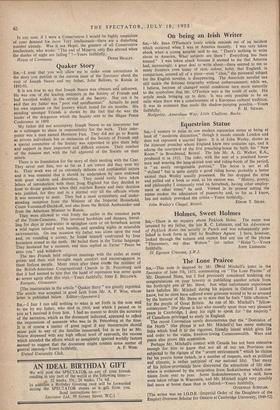Quaker Story
SIR,—I trust that you will allow me to make some corrections in the story you publish in the current issue of the Spectator about the visit of Joseph Neave and my father, John Bellows, to Russia in 1892-93.
It is not true to say that Joseph Neave was obscure and unknown. He was one of the leading ministers in the Society of Friends and had travelled widely in the service of the Society. Nor can it be said that my father was " poor and uninfluential." Actually he paid his own expenses on this journey which lasted for six months. His standing amongst Friends is shown by the fact that he was the leader of the delegation which the Society sent to the Hague Peace Conference in 1899.
My father did not accompany Joseph Neave as an interpreter but as a colleague to share in responsibility for the work. Their inter- preter was a man named Hermann Fast. They did not go to Russia as private individuals but as emissaries of the Society of Friends and a special committee of the Society was appointed to give them help and support in their important and difficult mission. Their conduct of the mission met with the full approval of the Society on their return.
There is no foundation for the story of their meeting with the Czar. They never met him, nor as far as I am aware did they ever try to. Their work was of an extremely delicate and confidential nature and it was essential that it should be undertaken by men endowed with great wisdom and discretion. They could easily have taken letters of introduction with them from England but they decided to trust to divine guidance when they reached Russia and their decision was justified, for they met in a normal way all the officials whom it was necessary to meet. They had a most sympathetic and under- standing reception from the Minister of the Imperial Household, Count Vorontzoff-Dashkoff, and also from the British Ambassador and from the American Minister to Russia.
They were allowed to visit freely the exiles in the remotest parts of the Trans-Caucasus. This involved hardships and dangers, travel- ling for days in mid-winter in springless carts or on horseback across a wild region infested with bandits, and spending nights in miserable caravanserais. On one occasion my father was alone upon the road and, on rounding a corner, he found himself confronted by four horsemen armed to the teeth. He hailed them in the Tartar language. They hesitated for a moment, and then replied in Tartar " Peace be unto you " and withdrew. The two Friends held religious meetings with the exiles at many points and their visit brought much comfort and encouragement to these forlorn people. Many years after these events the minister of the British-American Congregational Church in St. Petersburg said that it had seemed to him that the hand of repression was never quite so severe again after this visit.—Yours faithfully, JOHN E. BELLOWS.
Eastgate, Gloucester.
[The inaccuracies in the article " Quaker Story " are greatly regretted. The article was accepted in good faith from Mr. A. F. Wise, whose letter is published below. Editor—Spectator.] fear I can add nothing to what is set forth in the note sent to me by my father, who died in 1916, and which I passed on to you as I received it from him. I had no reason to doubt the accuracy of the narrative, which as the document indicated, appeared to reflect the impressions of someone who was in St. Petersburg at the time. It is of course a matter of great regret if any inaccuracies should cause pain to any of the families concerned, but in so far as Mr. Neave dispensed with any high official level of approach, the success which attended the efforts which so completely ignored worldly factors seemed to suggest that the document might contain some matter of


































 Previous page
Previous page